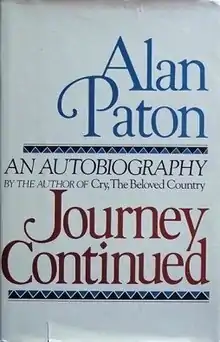Journey Continued: An Autobiography
Journey Continued: An Autobiography is the second part of Alan Paton's autobiography, the first being Towards the Mountain.

Paton had completed the writing and correction of the volume, but he died before its publication in 1988.[1]
Topics
The book addresses a wide variety of topics, personal, professional, philosophical, and political. For example, it discusses the way in which Paton's Cry, The Beloved Country was adapted for Broadway,[2] but it also discusses the Christian basis for Paton's activism.[3][4]
Journey Continued outlines long Paton's and deep involvement with the Liberal Party of South Africa, and his views on liberalism and its distinctness from other political philosophies.[4][5][6]
Quotations
"Between communists and liberals ... there is a fundamental incompatibility. ... A liberal cannot accept that the use of any means is justifiable if the end is good; a communist can. A liberal shrinks from the idea of a centrally controlled society, and a centrally controlled economy; a communist does not. The liberal belief in the separation of powers is not acceptable to communists. A liberal believes that a centrally controlled economy kills private initiative and drive, and leads to a drab and dreary existence. A liberal believes in the rule of law, the communist believes in the rule of the party."
— Alan Paton, Journey Continued[7]
References
- Journey Continued by Alan Paton, Oxford University Press, 1988, ISBN 978-0-19-219237-0.
- Battersby, John D. (1988-04-02). "Reflections On 'Beloved Country'". The New York Times. Retrieved 2016-12-12.
- Solomon, Charles (1990-01-14). "JOURNEY CONTINUED: An Autobiography by Alan Paton". Los Angeles Times. Retrieved 2016-12-12.
- Ngwenya, Thengani H (1997). "The liberal‐Christian vision in Alan Paton's autobiography". Current Writing: Text and Reception in Southern Africa. 9 (2): 36–56. doi:10.1080/1013929X.1997.9678021.
- Sharp, Travis K. (2005). "Peace Profile: The African Resistance Movement". Peace Review. 17 (4): 455–462. doi:10.1080/10402650500374793. S2CID 144588057.
- Black, Michael (January 1992). "Alan Paton and the Rule of Law". African Affairs. 91 (362): 53–72. doi:10.1093/afraf/91.362.53. JSTOR 722562.
- Paton, Alan (1988). Journey Continued: An Autobiography. Oxford University Press. p. 68. ISBN 9780192192370.